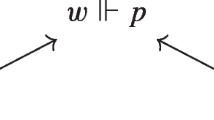Abstract
Classical modal logics (Segerberg [27], Chellas [2]) are weaker than the well-known normal modal logics: The only rule that is common to all classical modal logics is
(We nevertheless note that this principle raises problems in systems containing equality (Hughes and Cresswell [14]).)
Access this chapter
Tax calculation will be finalised at checkout
Purchases are for personal use only
Preview
Unable to display preview. Download preview PDF.
Similar content being viewed by others
References
L. Catach. Normal multimodal logics. In: Proc. Nat. Conf. on AI (AAAI88), pp. 491–495, 1988.
B. F. Chellas. Modal Logic: An Introduction. Cambridge University Press, Cambridge, 1980.
R. Fagin, J. Y. Halpern. Belief, Awareness, and Limited Reasoning. Journal of Artificial Intelligence, 34, 39–76, 1988.
L. Farinas del Cerro, A. Herzig. Automated Deduction for Epistemic and Temporal Logics. In: Handbook of Logic in AI and Logic Programming, Vol. 4: Epistemic and Temporal Reasoning, D. Gabbay, C.J. Hogger, J. A. Robinson, (eds.), pp. 499–594. Oxford University Press, Oxford, 1995.
M. Fitting. Proof Methods for Modal and Intuitionistic Logics. Reidel, Dordrecht, 1983.
M. Fitting. Modal Logics. In: Handbook ofLogic in Artificial Intelligence and Logic Programming, Vol. 1: Logical Foundations, D. Gabbay, C. J. Hogger, J. A. Robinson, (eds.), 365–448. Oxford University Press, Oxford, 1994.
O. Gasquet. Deduction for Multimodal Logics. In: International Conference on Applied Logic (Logic at Work’92), Amsterdam, 1992.
O. Gasquet. Optimised Deduction for Multimodal Logics. In: Applied Logic: How, What and Why?,M. Masuch, L. Polos, (eds.), Kluwer, Dordrecht, to appear.
O. Gasquet, A. Herzig. Translating Inaccessible Worlds Logic into Bimodal Logic. In: Proc. Eur. Conf. on Symbolic and Quantitative Approaches to Reasoning and Uncertainty (ECSQARU-93), Granada. LNCS, Springer-Verlag, Berlin, 1993.
O. Gasquet, A. Herzig. Translating Non-Normal Modal Logics into Normal Modal Logics. In: A. I. J. Jones, M. Sergot, (eds.), Proc. Int. Workshop on Deantic Logic. 1993.
V. Goranko. Modal Definability in Enriched Languages. Notre Dame Journal of Formal Logic, 31, 81–105, 1990.
V. Goranko. Completeness and Incompleteness in the Bimodal Base L(R,R-). In: P. Petkov, (ed.), Mathematical Logic. Plenum Press, New York, 1990.
V. Goranko, S. Passy. Using the universal modality: gains and questions. J. Logic Computat., 2, 5–30, 1992.
G. Hughes, M. J. Cresswell. An introduction to modal logic. Methuen, London, 1968.
L. I. Humberstone. Inaccessible worlds. Notre Dame Journal of Formal Logic, 24, 346–352, 1983.
A. J. I. Jones, 1. Pörn. Ideality, Sub-Ideality and Deontic Logic. Synthese, 65, 1985.
A. J. I. Jones, I. Porn. Ought and Must. Synthese, 66, 1986.
M. Kracht. How completeness and correspondence theory got married. In: M. de Rijke, (ed.), Dianumds and Defaults. Kluwer, Dordrecht, 1993.
H. Levesque. All I know: A study in autoepistemic logic. Artificial Intelligence, 42, 263–309, 1990.
R. Montague. Logical necessity, physical necessity, ethics, and quantifiers. Inquiry, 4, 259–269, 1960.
A. Nonengart. First-Order Modal Logic Theorem Proving and Functional Simulation. In: International Joint Conference on Artificial Intelligence, Chambéry, 1993.
H. J. Ohlbach. A Resolution Calculus for Modal Logics. In: E. Lusk, R. Overbeek (eds.), Proceedings of CADE ‘88, Lecture Notes in Computer Science, Vol. 310. Springer Verlag, Berlin, 1988.
H. J. Ohlbach. Semantics-Based Translation Method for Modal Logics. Journal of Logic and Computation, 1, 691–746, 1991.
H. J. Ohlbach. Optimized Translation of Multi-Modal Logic into Predicate Logic. In: A. Voronkov, (ed.), Proc. of Int. Conf. on Logic Programming and Automated Reasoning (LPAR), Lecture Notes in Artificial Intelligence, pp. 253–264. Springer Verlag, Berlin, 1993.
H. J. Ohlbach, A. Herzig. Parameter Structures for Parametrized Modal Operators. International Joint Conference on Artificial Intelligence, 1991.
H. Sahlgvist. Completeness and correspondence in the first and second order semantics for modal logics. In: S. Kanger (ed.), Proc. 3rd Scand. Logic Symp., pp. 110–143. North-Holland, Amsterdam, 1973.
K. Segerberg. An essay in classical modal logic. Filosofiska Studier, 13, Uppsala, 1971.
F. Wolter. Interpretations of monotonic modal logics as normal modal logics. Personal Communication, Dept. of Mathematics, FU Berlin, Jan. 1994.
Author information
Authors and Affiliations
Editor information
Editors and Affiliations
Rights and permissions
Copyright information
© 1996 Springer Science+Business Media Dordrecht
About this chapter
Cite this chapter
Gasquet, O., Herzig, A. (1996). From Classical to Normal Modal Logics. In: Wansing, H. (eds) Proof Theory of Modal Logic. Applied Logic Series, vol 2. Springer, Dordrecht. https://doi.org/10.1007/978-94-017-2798-3_15
Download citation
DOI: https://doi.org/10.1007/978-94-017-2798-3_15
Publisher Name: Springer, Dordrecht
Print ISBN: 978-90-481-4720-5
Online ISBN: 978-94-017-2798-3
eBook Packages: Springer Book Archive




